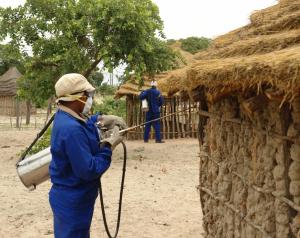Namibia celebrates progress towards eliminating Malaria
On 25 April every year, the world comes together to share information and experiences on malaria prevention and control, and to celebrate key milestones achieved in the fight against malaria. The Ministry of Health and Social Services (MoHSS) commemorated World Malaria Day at Khorixas, in the Kunene region on 14 August 2024 under the global theme “Advancing health equity, gender equality and human rights” and the national theme “Ensuring safe communities with zero malaria”. World Malaria Day highlights the need for continued investments and sustained political commitment to malaria prevention and control, and to raise awareness of Malaria prevention and control elimination at the national level.
Khorixas Mayor, Her Worship Honorable Councilor Patience !Hoaes pledged the town’s commitment to continue delivering services for the community they serve. She further urged communities to join the effort of creating awareness on malaria prevention and elimination countrywide.
The Minister of Health and Social Services, Dr. Kalumbi Shangula used the event to launch three national documents namely: National Malaria Case Management guidelines, Surveillance guidelines for Malaria Elimination and the National Malaria Elimination Strategic Plan 2023 - 2027. The indoor residual spray (IRS) campaign was also launched by the Minister, which marks the start of the year's spray campaign. IRS has been the main vector control intervention implemented in Namibia which is intended to reduce the adult mosquito vector density and longevity and lead to a reduction in malaria transmission. “Our priority remains anchored on the imperative of strengthening barrier methods such as the promotion of the use of long-lasting insecticide nets and vector control through IRS,” said Dr. Shangula. He further added that MoHSS will continue to strengthen case management through regular mentorship of health workers, while scaling up surveillance for early detection of cases and treatment.
In 2017, World Health Organization (WHO) developed a framework for malaria elimination that guides the tools, activities, and dynamic strategies to achieve malaria elimination and to prevent re-establishment of transmission. The framework also supports the strategy of subnational verification in countries that have reached elimination in geographically isolated areas. The Khorixas Health District was awarded the Simon Kunene Award by the Southern African Development Community (SADC) Elimination 8, an initiative under SADC, aimed at bringing about the elimination of malaria in the region. The award is a recognition of the district’s efforts in reducing malaria cases to zero for three consecutive years through the Simon Kunene Award, and this is the first time it has been awarded to Namibia.
WHO Country Representative, Dr. Richard Banda highlighted that World Malaria Day permits the government, partners and communities to renew commitments and bolster malaria interventions. “I call on the government, affected communities, and partners to keep investing in malaria control and build resilient health systems while strengthening primary health care to ensure that quality services are available to all,” he added.
Currently, malaria is endemic in 10 out of the 14 regions of Namibia namely: Kavango East, Kavango West, Ohangwena, Zambezi, Omusati, Oshana, Kunene, Oshikoto, Omaheke, and Otjozondjupa.



